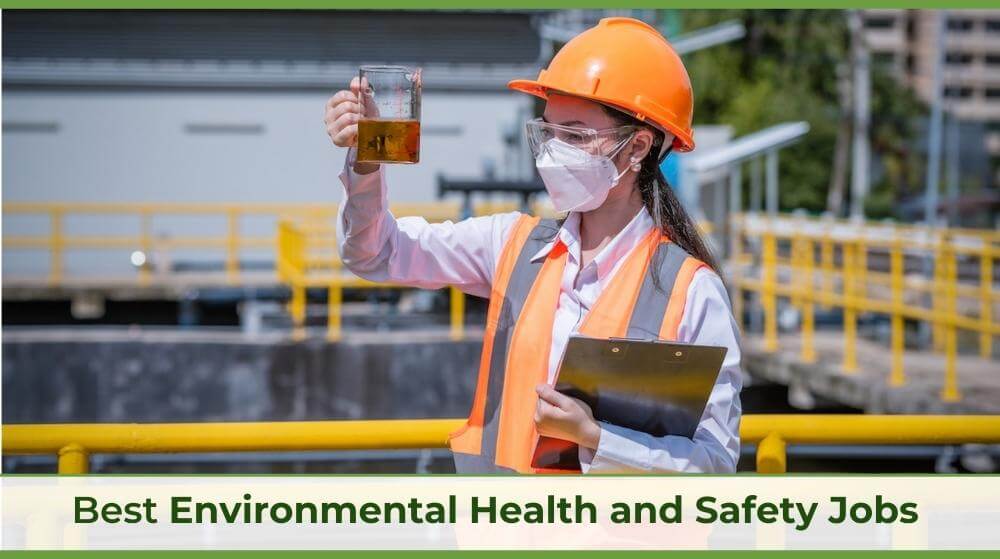
Environmental health and safety jobs combine problem-solving with a passion for protecting the planet and the people and animals living on it. These jobs range from technician positions working in the field and in labs to manager positions leading large sustainability projects.
Environmental health and safety (EHS) jobs include inspecting and monitoring private and public spaces for environmentally hazardous conditions. EHS careers are vital to addressing environmental crises and preventing future ones. This includes job responsibilities such as making and implementing plans to clean up oil spills and other contaminants. Keep reading for more information on the best EHS jobs and top degree programs to boost your career.

Learn to be a defender of the planet with a rewarding career in environmental health and safety.
Environmental Health and Safety Careers
The best EHS jobs are ones that pay well and are in high demand. The list below includes entry-level and senior positions to give you an idea of where an EHS career can take you. You may start your career as a technician and work your way up to manager or specialist with more EHS experience.
What is EHS experience? Hands-on experience in the field is essential for any environmental health and safety job. This includes learning how to collect samples of air, soil, water, and other matter; safely transport the samples to a lab; and analyze them using appropriate equipment and technology. Some EHS careers focus on making decisions based on data collected by other technicians, but fieldwork experience is a critical stepping stone to those positions.

Environmental Health & Safety Manager
If you are looking for a leadership position in the environmental health and safety field, then an EHS manager job may be perfect for you! Environmental health and safety managers lead various programs and projects to ensure that the environment, people, and workplaces are safe. In addition to the technical skills and knowledge required to do this job, environmental health and safety manager requirements include strong communication skills and the ability to work well in high-stress situations.
- Average Salary: $74,870
- Recommended Degree: BS in Environmental Health and Safety
EHS managers are sometimes referred to as Environmental Health and Safety Directors, although EHS directors have the potential to earn higher salaries than managers. The job may require travel to sites where emergencies or incidents occurred. EHS managers and directors often work long hours when managing active crises.
EHS managers and directors may work on contracts or full-time. Many work for government agencies such as the EPA, while others work for private businesses. Fields directly impacting the environment and high-risk work such as construction and manufacturing employ the most EHS managers. These industries must work carefully to ensure they are meeting environmental and occupational regulations.
Occupational Health and Safety Specialist
Occupational health and safety specialists focus more on workplaces than the natural environment, but their work directly affects the environment. For example, they may work to make sure that a company’s factories are within government regulations for nitrous oxide emissions. These specialists also inspect workplaces to ensure they are meeting OSHA regulations to keep workers safe.
- Average Salary: $74,870
- Recommended Degree: BS in Environmental Health and Safety
Whether you are working as an occupational or an environmental health and safety specialist, you will need to be detail-oriented and good at collaborating to solve complex problems. Specialists often hold leadership roles that include managing occupational health and safety technicians. Therefore, strong communication skills and the ability to delegate are helpful for this career.
The majority of occupational health and safety specialists work for government agencies. Others work for manufacturing and construction companies to ensure they are following government and industry regulations. This job often requires travel to various fieldwork sites. The job is sometimes referred to as environmental health and safety officer.
Environmental Science and Protection Technician
Environmental science and protection technicians work to monitor the environment and identify hazards such as pollution and contamination. This job is crucial to ensuring that we protect natural resources including water and air quality all over the country.
- Average Salary: $47,370
- Recommended Degree: BS in Environmental Health and Safety
This environmental health and safety job involves a lot of time in the field collecting samples and transporting them back to the lab for analysis. If you like hands-on work and being outdoors, this may be the right career for you. Environmental science and protection techs work primarily for consulting services and local government agencies.
This is an entry-level job that often only requires a 2-year degree. It’s a great stepping stone for you to gain EHS experience in the field while working towards your bachelor’s degree. This could lead to higher-paying positions later in your career, such as Environmental Health and Safety Specialist or Sustainability Manager.

Environmental Planner/Project Manager
Environmental planners and project managers may work in urban, suburban, and/or rural settings. Environmental planners focus on sustainability in the development and implementation of projects. Example projects include a new county park or a high-rise building. Environmental planners help ensure that companies are following all governmental and industry regulations with their development projects.
- Average Salary: $73,570
- Recommended Degree: BS in Environmental Health and Wellness
For an introduction to environmental planning, check out this 5-week online GIS course.
While a negative environmental impact may be unavoidable with some projects, environmental planners work collaboratively with other project managers to minimize harmful effects. The majority of environmental planners work for the local or federal government, but some are employed by private consulting and technology companies. Companies interested in health and wellness often hire environmental planners as well.
Being an environmental planner/project manager means a mix of working in an office, attending meetings, and being in the field to manage active projects. This leadership position requires thinking creatively and communicating clearly. Environmental planners also use technology such as Geographic Information System (GIS) software to analyze, visualize, and present data for sustainable project development.
Compliance Specialist
Government agencies of all levels employ compliance specialists, but the majority of them work for the federal government. This includes agencies such as OSHA (Occupational Safety and Health Administration) and the FDA (Food and Drug Administration).
- Average Salary: $71,650
- Recommended Degree: BS in Environmental Health and Safety
Compliance specialists often travel to different sites to inspect buildings and workplaces. They may also interview employees at each company they inspect. This gives them a complete picture of the rules and procedures that a company follows. Lastly, this job requires a good amount of paperwork, so strong written communication skills and attention to detail are beneficial.
While regulatory positions may not seem exciting, they are very important to ensure that environmental protection laws and regulations are actually being followed. As a compliance specialist, you may work closely with businesses to help them become compliant with certain laws or regulations. This may require several follow-up visits before companies are up to compliance standards. Compliance specialists often develop friendly relationships with companies to work with them rather than against them.
Sustainability Manager
A sustainability manager is similar to an EHS manager with a specific focus on sustainability rather than health and safety. This job is sometimes called a sustainable design consultant because it includes designing buildings, businesses, and/or products that are as sustainable as possible.
- Average Salary: $76,530
- Recommended Degree: BS in Environmental Studies or BS in Sustainable Business Management
Private companies often hire sustainability managers to ensure that business growth is sustainable for the surrounding environment. This includes using renewable resources when possible such as wind or solar energy. A successful sustainability manager will be familiar with solar panel and wind turbine technologies.
Government agencies also employ sustainability managers. Many sustainability managers work as consultants, while others work as full-time employees. Being a sustainability consultant allows you to have flexible hours and choose which projects you want to work on.
Sustainability managers should have strong written and oral communication skills. They are often required to give presentations in meetings and collaborate with diverse teams. Like other EHS careers, knowledge of environmental laws and regulations is necessary for sustainability managers. An understanding of business principles will also help you succeed in this career.

Wastewater Technician
Wastewater technician is another environmental health and safety job that only requires two years of college. If you are looking for stable career options without the high cost of a bachelor’s degree, consider a job in wastewater technology. Simply complete an online certificate program in wastewater technology and pass the wastewater technician licensure exam to begin your career.
- Average Salary: $47,880
- Recommended Degree: Certificate in Wastewater Technology
Clean water is essential to the planet and to all the people and animals who call it home. Wastewater technicians work to ensure people have access to clean, safe water and that sewage and other waste are disposed of properly. Most wastewater technicians work in water treatment plants to operate and maintain equipment. Local governments usually own these plants.
This job is physically demanding. Wastewater technicians are often on their feet all day performing manual labor. The job requires cleaning equipment, testing water, and recording results. Lastly, wastewater technicians should have a strong grasp of EPA regulations and other relevant laws. This will ensure that you are always staying in compliance and keeping water safe and drinkable.
Environmental Toxicologist
Environmental toxicologists are scientists who study how toxic chemicals affect plants, animals, and ecosystems. Their work directly affects humans because we eat plants and animals, and we interact with the natural environment around us. Harmful chemicals may enter our food supply through contaminated waterways, soil, or animal feed. They may enter our bodies simply by breathing air or by gardening. Environmental toxicology is a vital career to keep us and our planet safe.
- Average Salary: $76,530
- Recommended Degree: BS in Environmental Health and Safety
Environmental toxicologists conduct fieldwork and lab research to understand the effects of different toxic chemicals on different natural environments. Rather than enforce EPA regulations as compliance officers and EHS managers do, toxicologists inform new regulations and laws through their research. They often work for federal government agencies such as the FDA or for local and state governments.
Private companies that handle toxic chemicals also employ environmental toxicologists to help prevent or minimize the negative impacts of working with those chemicals. This may look like setting exposure limits and/or developing strict safety protocols. Whether you choose to work in the public or private sector, you may want to seek an M.S. or Ph.D. in environmental toxicology after you earn a bachelor’s degree.
Why are Environmental Health and Safety Jobs Important?
Environmental health and safety careers may not be the most glamorous, but they are essential to protecting people and the environment. Without workplace inspectors, workers could be at risk of injury on the job. Without compliance specialists and wastewater technicians, the regulatory laws in place to protect citizens might not be followed. This could put the environment, animals, and people at risk. For example, without environmental science and protection technicians monitoring soil levels around a factory, leaks of harmful chemicals like lead could go undetected.
People in EHS careers can also help minimize the effects of climate change by monitoring and addressing air pollution levels, water levels, and other factors that exacerbate global warming. So choose a career in environmental health and safety and go to work every day knowing that you are making a difference in people’s lives and making the planet a better place.

Explore Environmental Health and Safety Programs at Unity Environmental University
In our increasingly industrialized world, environmental health and safety jobs continue to be in demand. These jobs fill essential roles in our society to ensure that businesses and governments do their part to protect the planet. EHS careers provide financial stability and a sense of purpose. And there are so many great options for environmental health and safety jobs, from working for a regulatory agency like the EPA to managing a sustainable wellness business.
Start your career in environmental health and safety off strong with an innovative hybrid in-person/online program at Unity Environmental University. This gives you the flexibility to explore all the excellent EHS career paths before choosing the best one for you.
